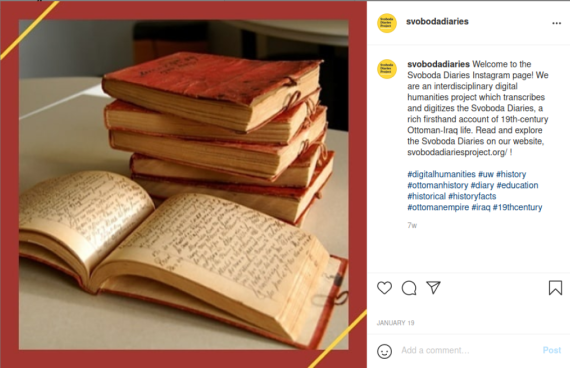In the late 19th century, Joseph Mathia Svoboda recorded his life as a steamship purser for a British company. His diaries provide a rich and unique firsthand look into the late Ottoman Empire. Many of his entries, spanning the 1860s to 1908 in 61 journals, log weather conditions or shipping routes in addition to entries about his personal life―time spent with friends, important family events―and more.
In the 1970s, scholar Margaret Makiya began transcribing the Svoboda Diaries. Then, in 1985, Professor Henry Svoboda, descendant of the Svoboda family, began writing a family history using the Svoboda Diaries with the help of Iraqi researcher and Svoboda Diaries Project co-director Nowf Allawi. After the death of Professor Svoboda in 2005, Allawi reached out to Professor Walter Andrews and the Ottoman Texts Archive Project to continue the transcription of the diaries, and the Svoboda Diaries Project was born. Since the project’s inception in 2006, the project has grown to an active, interdisciplinary team of 20-25 annual student interns, faculty, and external collaborators.
The project’s goal is to transcribe and digitize the Svoboda Diaries, increase awareness of the diaries as an important primary source and view into late 19th century Ottoman Iraq, and promote study and research with the diaries.
In addition to the transcription and digitization of the diaries, the Svoboda Diaries Project Team is currently working on making the project more accessible to the public. The website’s Diary Viewer allows users to read the transcribed diaries side by side with digital images of the original texts, while the Events Timeline invites visitors to explore important events from one of the diaries. Interns are currently working on research that charts the paths that Joseph Svoboda took in his journeys on the Tigris River and employs natural language processing techniques to identify persons and explore social interactions in the diaries. Most recently, we have added Instagram in addition to Twitter as media through which readers can experience the diaries.
If you are interested in learning more or getting involved, please follow us on Twitter (@SvobodaDiaries) and Instagram (@svobodadiaries), where we post updates and feature the work and content from our website. You can also contact the project Co-Directors, Drs. Annie T. Chen (atchen@uw.edu) and Selim S. Kuru (selims@uw.edu)
